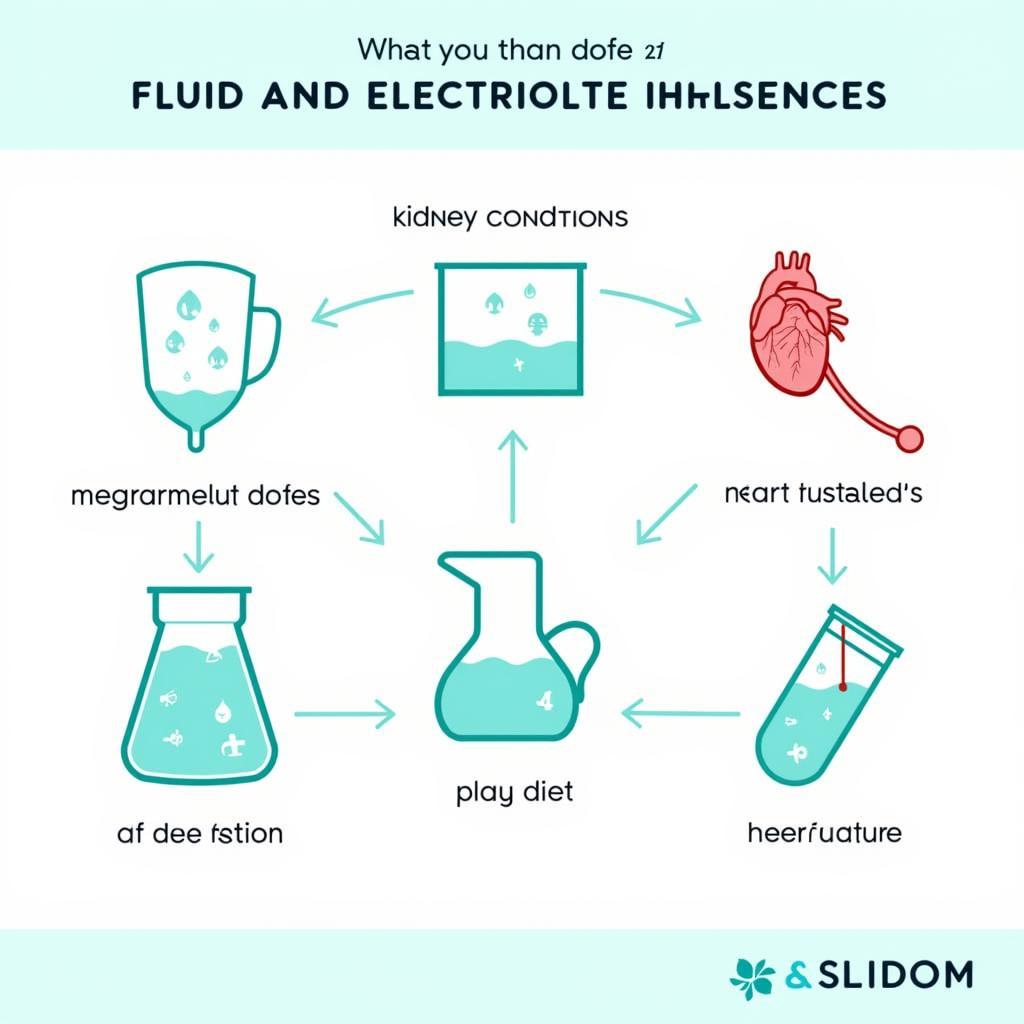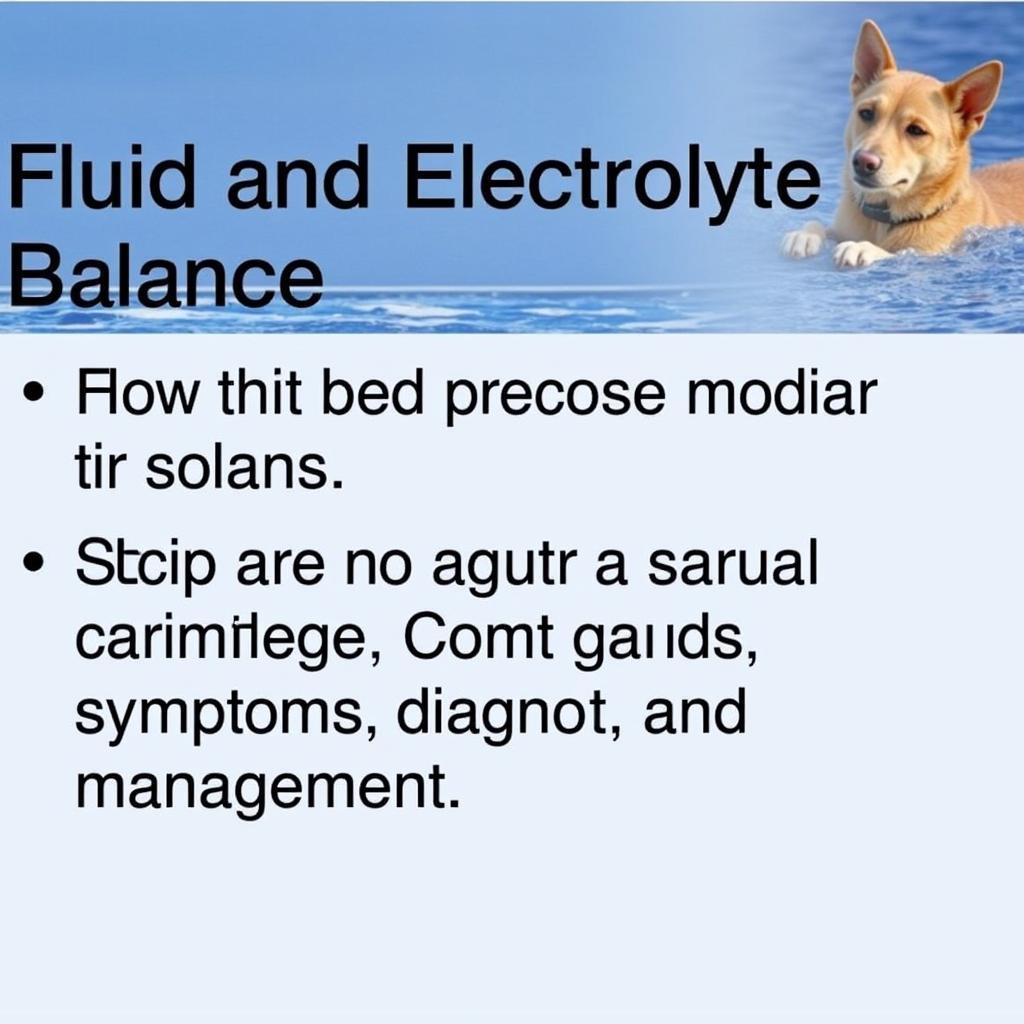Fluid and electrolyte imbalance is a common health concern affecting the delicate balance of fluids and minerals within our bodies. These imbalances can stem from various causes, ranging from dehydration and excessive sweating to underlying medical conditions. Understanding the causes, symptoms, and management of these imbalances is crucial for maintaining optimal health. This guide explores the intricacies of fluid and electrolyte balance and offers valuable insights for both healthcare professionals and individuals seeking to learn more.
Understanding Fluid and Electrolyte Balance
Our bodies rely on a complex interplay of fluids and electrolytes to function effectively. Fluids, primarily water, transport nutrients, regulate temperature, and facilitate various physiological processes. Electrolytes, such as sodium, potassium, calcium, and magnesium, are minerals that carry an electrical charge and play essential roles in muscle function, nerve transmission, and fluid balance. Maintaining the proper balance of these components is paramount for overall health and well-being.
Causes of Fluid and Electrolyte Imbalance
Numerous factors can disrupt fluid and electrolyte balance. Common causes include:
- Dehydration: Insufficient fluid intake, excessive sweating, vomiting, and diarrhea can lead to significant fluid loss and electrolyte imbalances.
- Medical Conditions: Kidney disease, heart failure, and diabetes can impair the body’s ability to regulate fluids and electrolytes.
- Medications: Certain medications, such as diuretics and laxatives, can affect fluid and electrolyte levels.
- Poor Diet: A diet lacking in essential minerals can contribute to electrolyte imbalances.
 Common Causes of Fluid and Electrolyte Imbalance
Common Causes of Fluid and Electrolyte Imbalance
Recognizing the Symptoms
Recognizing the symptoms of fluid and electrolyte imbalance is crucial for prompt intervention. Symptoms can vary depending on the specific imbalance but may include:
- Muscle Weakness or Cramps: Electrolyte imbalances can disrupt muscle function, leading to weakness or cramping.
- Fatigue and Weakness: Dehydration and electrolyte imbalances can cause general fatigue and weakness.
- Irregular Heartbeat: Electrolyte imbalances, particularly potassium imbalances, can affect heart rhythm.
- Dizziness or Lightheadedness: Fluid loss can lead to low blood pressure, causing dizziness or lightheadedness.
- Confusion and Irritability: Electrolyte imbalances can impact brain function, leading to confusion and irritability.
Managing Fluid and Electrolyte Imbalance
Management strategies for fluid and electrolyte imbalances depend on the underlying cause and severity of the imbalance. Common approaches include:
- Oral Rehydration: Mild dehydration can often be managed by increasing fluid intake. Electrolyte solutions can help replenish lost minerals.
- Intravenous Fluids: Severe dehydration or electrolyte imbalances may require intravenous fluid administration to restore balance quickly.
- Dietary Changes: Adjusting your diet to include electrolyte-rich foods can help prevent and manage imbalances.
- Medication Management: If medications are contributing to the imbalance, adjustments or alternative medications may be necessary.
Fluid and Electrolyte Imbalance PPT Free Download
To further enhance your understanding of this crucial topic, we offer a free PowerPoint presentation for download. This comprehensive presentation covers the key aspects of fluid and electrolyte balance, including causes, symptoms, diagnosis, and management.
 Free Fluid and Electrolyte Imbalance PowerPoint Presentation Download
Free Fluid and Electrolyte Imbalance PowerPoint Presentation Download
Conclusion
Fluid and electrolyte imbalance can significantly impact overall health. Understanding the causes, recognizing the symptoms, and implementing appropriate management strategies are crucial for maintaining optimal well-being. By downloading our free fluid and electrolyte imbalance PPT, you can gain a deeper understanding of this important topic and empower yourself to take proactive steps towards maintaining a healthy balance.
FAQ
- What are the most common electrolytes in the body?
- How can I prevent dehydration?
- What foods are rich in electrolytes?
- When should I seek medical attention for fluid and electrolyte imbalance?
- What are the long-term effects of untreated fluid and electrolyte imbalance?
- Are there any natural remedies for mild electrolyte imbalances?
- How are fluid and electrolyte imbalances diagnosed?
For further assistance, please contact us at Phone Number: 0966819687, Email: squidgames@gmail.com or visit our address at 435 Quang Trung, Uong Bi, Quang Ninh 20000, Vietnam. We have a 24/7 customer support team. We also recommend reviewing our articles on related topics such as “Dehydration Symptoms and Treatment” and “Understanding Electrolyte Drinks”.